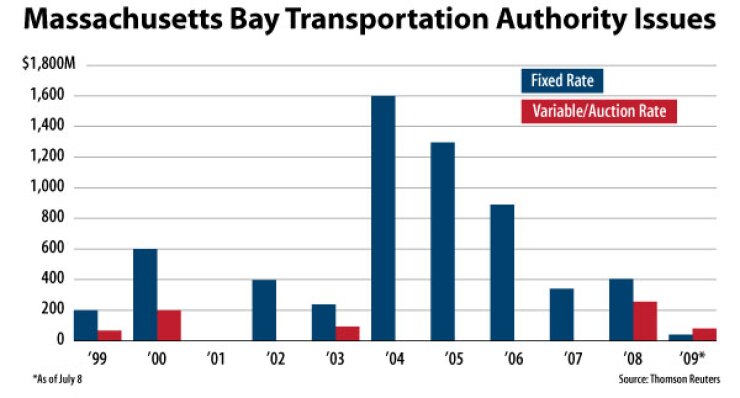
The Massachusetts Bay Transportation Authority is considering whether to move forward with two bond deals before it gains a new board of directors on Nov. 1 as part of the state’s overall transportation reform initiative.
At the same time, the MBTA is planning a nearly 20% fare increase this fall to generate $69 million of additional revenue and avoid service reductions during the next two years, according to an agency document.
The authority is evaluating a potential $150 million refunding deal with Goldman Sachs & Co. that would refinance existing variable-rate debt into fixed-rate mode and terminate a swap agreement attached to the floating-rate bonds. That transaction would price within the next two months if the authority chooses to move forward with the refinancing, according to chief financial officer Jonathan Davis.
“It’s a structure that would eliminate one of the swaps that we have, get rid of the variable-rate debt component, and ultimately end up with a small savings,” Davis said. “We’re looking at that. I don’t know whether or not we would or would not do that. If we did, I think we’d get that done in the next 30 to 45 days.”
In addition, the MBTA plans to sell $200 million to $230 million of new-money debt and may opt to issue those bonds before a new board of directors is appointed on Nov. 1 or continue with a plan to sell the debt in December or January.
“The board changes come Nov. 1,” Davis said. “One of the things we’re considering is whether or not we should do some new money now or wait until the new board is put in place. So that’s under consideration. My guess is we’ll continue with the same plan that we had that probably sometime in the December or early January time period we’ll be out in the marketplace for new money.”
Gov. Deval Patrick last month signed legislation that will merge most transportation systems under a new authority, the Massachusetts Department of Transportation. While the Massachusetts Turnpike Authority will cease to exist, the MBTA will remain and operate under MassDOT’s umbrella starting Nov. 1.
The MBTA’s new board will consist of five members appointed by the governor. The authority currently has eight governor-appointed directors, with Massachusetts’ secretary of transportation chairing the panel.
Davis said the agency is still evaluating whether to structure the new-money sale with sales tax revenues that the MBTA receives from the commonwealth or assessment revenues that it gains from cities and towns where the mass transit system operates.
Lawmakers last month approved increasing Massachusetts’ sales tax to 6.25% from 5%. The MBTA receives 20% of the sales tax receipts, but their sluggish performance has left the authority with $275 million less in sales tax revenues since lawmakers implemented the 20% dedication in 2001.
“We have in the past gone out primarily with assessment bonds for new money, but we would assess the marketplace as to which credit we would use as we get closer to the transaction,” he said.
The MBTA has $5.2 billion of outstanding debt. Standard & Poor’s rates its sales tax bonds and special assessment bonds at AAA. Moody’s Investors Service rates the sales tax debt Aa2 and the special assessment bonds Aa1.
The authority is reviewing an overall 19.5% fare increase on bus, rapid transit, and commuter rail lines, with one public hearing set for Aug. 27. No additional public hearings are planned.
The potential fare hike would offer $69 million of new fare-box revenue and help offset growing debt service costs. While principal and interest payments increased by $77 million to $445 million in fiscal 2010, officials expect that amount to increase again in fiscal 2011 by $37 million. Debt service accounts for 30% of MBTA’s operating budget.
“What we’re trying to do is look for a three-year solution because it doesn’t make sense to be in the same situation a year from now or thereafter,” Davis said. “We would like to put something in place that would get us through the next three years.”
The MBTA received $160 million of state aid to help balance its budget for fiscal 2010, which began July 1, and the commonwealth will continue to allocate the $160 million annually.





